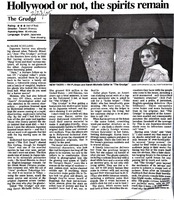Archival Concepts and Practices
Archival Concepts and Practices:
Legal Concerns:
The most pressing legal concern in our archive is privacy concerns. Mark Schilling is a living person and donated these materials at the request of a U-M faculty member. The University of Michigan has yet to officially process these materials (our group had the opportunity to go through these unprocessed boxes at the Donald Hall Collection). Although many of these materials contain published works, other materials are hand-written notes and letters that mention living individuals. In the “In Secret Kept, In Silence Sealed: Privacy in the Papers of Authors and Celebrities” author Sara Hodson coins these individuals as ‘third parties’ and states that, ‘these third parties had no voice in deciding the fate of the papers, and are unlikely to have been consulted about any potential sensitivity in the collection” (Hodson ‘04). This scenario came up while investigating the Mark Schilling documents that have not even been initially processed by the University. To ensure living individuals' privacy, any document that was unrelated to Japanese Horror or were personal writtens (letters, diary, etc.) without a distinct value to our project were excluded.
Ethical Concerns:
Our group interviewed Mark Schilling about Japanese Horror and the items in his collection, and Mark Schilling will be given access to view our project. This is the first crack U-M has had at organizing Mark Schilling’s life's work. We need to keep in mind that for Mark Schilling this work is personal; his reviews and materials are the product of 30 years of work and not just a school project. It is similar to Tee Corinne and her collection examined in the article, "Lifetimes and Legacies: Mortality, Immortality, and the Needs of Aging and Dying Donors" by Geoff Wexler and Linda Long. Tee Corinne was a famous artist who donated their personal papers related to the LGBTQIA+ community to the University of Oregon. The papers left to Oregon are Tee’s legacy and she felt very strongly about how they would be used as they represent her. The author describes this responsibility as, “Having been trained as keepers of information, we archivists should know that we are also, whether we like it or not, keepers of sacred legacies" (Wexler & Long). Although Tee was thinking about her legacy in terms of her final goodbyes, our collection is also a representation of Mark Schilling’s legacy. We had an ethical obligation to help tell Mark Schilling’s story in a reverent way.
Cultural Concerns:
The most obvious cultural concern we had to navigate throughout this project was diving into Japanese culture in a respectful way; as no member of our group is a part of the Japanese culture. Our archive seeks to represent Japanese culture and without making broad generalizations about it and without imposing Western culture biases onto Japanese art. To combat this, we-relied heavily on Mark Schilling’s materials to help navigate our understanding of J-Horror, as he is the English-Langugae expert on Japanese film. In addition, we worked with the U-M Asian-Culture Librarian to help develop and trace the thematic origins of many horror films.
